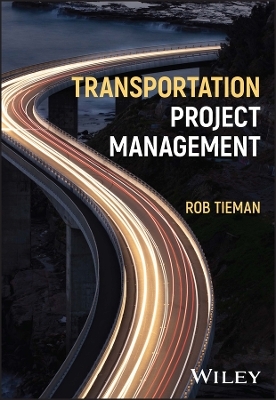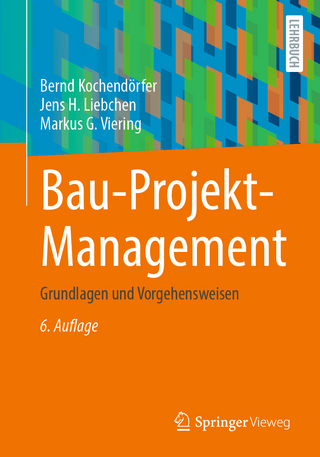
Transportation Project Management
John Wiley & Sons Inc (Verlag)
978-1-394-18547-4 (ISBN)
Transportation Project Management is a comprehensive and approachable work providing practical guidance on all aspects of managing transportation projects. It covers project management principles, practical applications, and proven best practices, all tailored specifically to the unique workflows of developing and designing transportation projects, from inception through to advertisement for construction.
Detailed themes include technical competencies, industry constraints, organizational opportunities, and the range of soft skills necessary to be an effective leader in this role. This timely publication responds to recent trends in the industry, as transportation organizations become more project-centric in their strategic approach, to enable more efficient project and program delivery amidst increased spending on infrastructure.
Some topics covered in Transportation Project Management include:
The “Triple Constraint” of budget, scope, and schedule, and meaningful change management
The transportation Project Development Process and its unique interdependencies, opportunities, and constraints
Creating your project management plan, a living document providing guidance and clarification on how the project will be managed during development
Organizational structures, establishing and understanding how your organization operates, including who makes what decisions
Understanding the fundamental differences between projects, programs, and portfolios, enabling successful project management within any organizational structure
Critical Project Management soft skills, including communication, time management, leading meetings, stakeholder engagement, influence management, and managing expectations
Developing and leading focused, efficient, and effective project teams
Partnering with consultants to manage risks, drive development, and increase quality
Aimed at professional transportation project managers in both the public and private sectors, along with engineering undergraduate and graduate students in related programs of study, Transportation Project Management provides the foundations for practitioners to become great transportation project managers.
Rob Tieman has over 25 years of management and engineering expertise concentrated in executive leadership of transportation projects, programs, and portfolios. He is currently the Director of the Project Management Office at the Virginia Department of Transportation. Rob also serves in a number of industry roles. Most notably, he chairs the AASHTO Technical Committee on Project Management (TCPM), is a member of the AASHTO Committee on Design (COD), and sits on the AASHTO COD Executive Committee. He holds a Civil Engineering degree from the University of Illinois, is a licensed Professional Engineer (PE), and is a certified Project Management Professional (PMP).
Contents
1 Project Management 101 1
1.1 Introduction 1
1.2Triple Constraint 3
1.3 The Project Management Plan 5
1.4 Organizational Basics 8
1.5 A Look Ahead 13
2 Project Development Process 15
2.1 Safety First 15
2.2 Overview 19
2.3 Scoping Phase 22
2.4 Preliminary Design Phase 28
2.5 Detailed Design Phase 30
2.6 Final Design and Right-of-Way Acquisition Phase 34
2.7 Advertise Plans 36
3 Budgets and Estimates 41
3.1 Overview 41
3.2 The Basics 45
3.3 Types of Estimates 50
3.4 Managing the Budget 57
3.5 Performance Metrics 62
4 Scope 67
4.1 Scoping Process 68
4.2 Schedule and Budget Baselines 74
4.3 Roles and Responsibilities 75
4.4 Scope Management 77
5 Schedule 83
5.1 Critical Path Method (CPM) 83
5.2 Schedule Management Plan 92
5.3 Scheduling Issues 94
6 Managing Risk 99
6.1 Why Risk Management Matters 99
6.2 Risk Management Plan 101
6.3 Risk Identification 102
6.4 Risk Analysis 106
6.5 Risk Responses 109
6.6 Monitoring Risks 113
7 Managing Resources 119
7.1 Developing and Managing a Team 119
7.2 Personality Assessments 125
7.3 Resource Planning 140
7.4 Managing Consultants 142
8 Managing Quality 151
8.1 Defining Quality 151
8.2 Monitoring and Controlling Quality 155
8.3 Measuring Quality 161
8.4 The Costs of Quality 164
9 Communications 169
9.1 Project Communications 169
9.2 Stakeholder Involvement and the Stakeholder Engagement Plan 175
9.3 Media Relations 185
10 Controlling the Project 195
10.1 Managing Expectations 195
10.2 Monitor/Control the Project 206
10.3 Change Management 213
10.4 Balancing Innovation – Performance-Based Design 216
10.5 Goals and OKRs 218
10.6 Project Management Methodologies 219
10.7 Performance Metrics 228
11 PM Soft Skills 243
11.1 The Importance of Soft Skills 243
11.2 Characteristics of a Successful PM 245
11.3 Meetings 247
11.4 Time Management 251
11.5 Influence Management 254
11.6 Advancing and Refuting Arguments 261
11.7 Professional Development 266
12 Real-World Challenges 269
12.1 Ethics 269
12.2Project Continuity 270
12.3 Managing Chaos 272
12.4 Surviving an Audit 274
12.5 Scaling Project Approaches 278
12.6 Guidance Pyramid 281
12.7 Planning Fallacy 283
12.8 Closing Thoughts 285
Index 287
| Erscheinungsdatum | 10.07.2023 |
|---|---|
| Verlagsort | New York |
| Sprache | englisch |
| Maße | 175 x 246 mm |
| Gewicht | 703 g |
| Themenwelt | Technik ► Bauwesen |
| ISBN-10 | 1-394-18547-2 / 1394185472 |
| ISBN-13 | 978-1-394-18547-4 / 9781394185474 |
| Zustand | Neuware |
| Informationen gemäß Produktsicherheitsverordnung (GPSR) | |
| Haben Sie eine Frage zum Produkt? |
aus dem Bereich


